|
 |
The Memotech MTX Series |
 |
MEMOTECH
The Russian Schools Bid
The UK Contenders
|
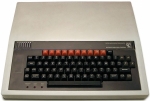 |
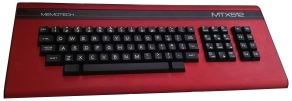 |
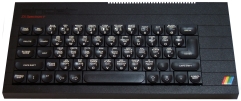 |
|
BBC Micro (Acorn) |
MTX512 (Memotech) |
ZX Spectrum+ (Sinclair) |
| The information on this page comes from various
sources that I have managed to find on the web -
mainly from magazine news articles of the time and
some recollections from Geoff
Boyd. I have tried not to quote unsubstantiated
comments from various other websites as I know that many
are factually incorrect - that includes the
ubiquitous
Wikipedia! |
|
If you
are aware of any inaccuracies on this page, or you
have any more details that you can share -
please get in touch |
Background
During the
Cold War,
Soviet block
access to Western computer technology, at least legally, was
limited by the embargos in place at the time. Although there was
some computer manufacturing capability in the region, this was
limited to indigenous designs, or those illegally cloned from
Western designs such as those of
IBM and
Apple
- and, "when
you care enough to steal the very best",
DEC!
In the 1980s, a
leading source of computers for the Soviet block were the
Pravetz
machines made in Bulgaria. (The same factory also produced a
clone of the Mototola MC6845, the CRT controller on the Memotech
80 Column card and the IBM CGA adapter, called the CM607P.)
In March 1985,
Mikhail
Gorbachev became General Secretary of the Communist Party of
the Soviet Union
- the leader of the Country. Gorbachev was determined the revive
the ailing Soviet economy through a number of reforms, including
a campaign of economic restructuring christened "perestroika",
intended to modernise industry and agriculture. The Party
leadership realised that the country lagged well behind the
computer technology of other countries such as those in Western
Europe and the US and introduced the new subject of
Informatics (computer science) in state schools in 1986
to teach pupils IT skills.
UK Computer Manufacturer
Interest
It was recognised that in order to support the
rapid deployment of computer technology in schools, domestic
manufacturing capability would be inadequate and foreign
assistance would be required. In preparation for a likely
tendering exercise, a 10 day long micro computer exhibition,
Technobuch '85, was held in Moscow early that year.
Three UK manufacturers,
Sinclair,
Acorn
and Memotech exhibited at the show, with both the Acorn and
Memotech machines able to demonstrate Cyrillic character sets.
Sinclair was represented by its European
Development Manager, Acorn by 3SL, its Eastern
European distributors and Memotech by UK distributors, The
Spectrum Group. Sinclair
managed to sell all of the
ZX Spectrum machines
on its stand (12) to the Russian
Ministry of Higher Education and
Acorn won orders for
the BBC Micro to the value of
£20,000 from the Moscow Education
Institute at the show - the culmination of a
years work by 3SL.
Unfortunately, The Spectrum Group
was unable to actually sell any Memotech machines, as they had
not received the necessary export licenses in time. An
inauspicious start to Memotech's efforts on the Russian bid, but
they were invited back to give an exclusive demonstration of the
MTX in the March of 1985. During that visit, The Spectrum
Group did manage to sell £20,000 worth of
Memotech MTX512
equipment to the State Committee for
Professional and Technical Education. It is
interesting to note that each of the three contenders appears to
have had some support from different state and city
institutions.
After the Memotech trip in March, Memotech
and Sinclair were both invited back to Russia in April for
further negotiations, it would appear that Acorn may have
been eliminated from the process by then. According to
Popular Computing Weekly, (PCW), at this point, Sinclair
had teamed up with
ICL who were tasked with carrying on the negotiations on
Sinclair's behalf, whilst Memotech continued to work with
The Spectrum Group.
The article in
Personal Computer News states that Memotech had had to
get permission from
NATO to
export their computers to an Iron Curtain country, a
reference to the embargo noted in the
background section above, but I am not sure that it
would
actually have been NATO that needed to grant such permission and
was more likely to have been the
CoCom
export control committee. A factor in Memotech's ability to
get export licenses was their use of the CP/M operating
system for the FDX since CP/M was not included in the
embargo whereas IBM PCs and MSDOS were included.
The First Order
However, by the July of 1985, seemingly to
the surprise of the UK contenders, the Russians announced
that the first order, for 10,000 machines, had been awarded
to Japan with an order placed through yet another body - the
Institute of Science and Technology. Again,
according to Popular Computing Weekly,
the Russians paid around £2m for the 10,000 machines that
they required by the end of the year in order to get their
education program started. The winner of this first order
was the
Yamaha
YIS503IIR (MSX-1) - a system with very similar technical
specifications to the MTX512, more details can be found on my
msxinfo page.
It appears that even in the light of this
announcement, the UK manufacturers had not given up all hope
of winning a contract from the Russians - believing that
this first order would be the first of a number of short
term purchases of different machines and that the MSX
contract was only valid for 1 year. Memotech believed that
they were still in the running for subsequent orders and had
been asked to return to Russia in the August with the MTX
computer.
Although Acorn are quoted in the July PCW
article, it makes no mention of Sinclair at this point and
it may be that they too had been dropped by the Russians,
possibly because of the limited interfacing abilities of the
Spectrum compared to the Memotech or Acorn machines.
The Memotech Offering
+
One of the goals of the new Russian schools
program was to provide education and training for robotics and
control applications. In an attempt to secure the contract, Memotech
had worked with the Norwegian company, Norbit Elektronikk, to
develop an add-on
electronics unit to be offered alongside the CP/M based
FDX disk system and with Oxford University to develop a
Russian (Cyrillic) version of the System and BASIC ROMs,
along with Russian documentation and keyboard.
A very limited number of prototype MTX
computers were built for the bid, these were actually a
different size from the standard MTX512 - they were cut-down
to remove the numeric keypad and reduce the cost. The
majority of these "standard" prototypes were the usual MTX
black and only a couple of prototypes were installed
in red cases for show. There are thought to be a very
limited number of standard MTXs
which have had red covers fitted using keyboard covers
produced during development of the prototypes - these were
probably put together "unofficially" by Memotech employees
in the factory at the time, like the example shown at the top of
this page.
|
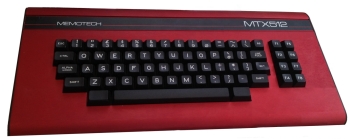 |
|
The machine for the Russian
Bid may have looked like this
(Based on Geoff Boyd's recollection of the
prototype) |
|
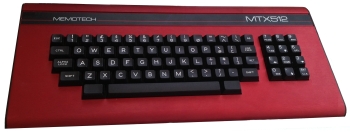 |
|
However, without the editing keys on the numeric
keypad, user interaction with BASIC would have
been difficult, even with the Russian ROM that
Memotech had developed. Perhaps it was the
function keys that were removed to reduce cost? |
Although I have not found any supporting
evidence, I think that the Memotech
Node (token ring
network) system may have been part of the Memotech
offering. This would have allowed a school classroom to have a
single FDX disk system providing file and network services for a number
of client machines - a similar feature was included in the
Yamaha MSX system.
To compliment the hardware, Memotech had SciSoft
develop a suite of Russian language programs on how to use
and program micro-processors. (In addition to developing a
wide range of educational software for the BBC Micro, Dragon
and Sinclair ZX81/Spectrum computers, SciSoft had previously
produced a range of educational programs for the MTX range
in English - most of these are available in the
Education section
of my MTX software downloads
page).
Norbit Elektronikk I/O System
According to the
Wikipedia
entry for the MTX: "The Norwegian company Norbit Elektronikk
Norge A/S run by
Anne Selene Fiko developed a complete
Input/Output (I/O) control system, with 4 × 16-bit (by swapping 8
bits at time) I/O ports, 8-bit Analog-to-Digital converter and
8-bit Digital-to-Analog converter, all with sensor systems for
robotics and controls. The control system was designed for the
same aluminium casing as the main MTX512 unit." (It was
actually built into an FDX-like chassis, rather than an MTX512
unit.)
The Misolima Publishing
blog for
Anne Selene describes the MTX interface as a "SuperToolBox" that
was developed from ToolBox '85.
Quote from the blog :-
"Anne Selene with her Norwegian company, Norbit Electronics
located in Steinkjer, Norway along with the Memotech factory in
Oxford and the University of Oxford, England, developed its
ToolBox ’85 into Super-ToolBox for Memotech MTX computers. This
system consisted of a complete hardware I/O system to be used in
robotics at the Russian schools. In connection with Memotech’s
plans to provide Memotech computers to 65 000 Russian schools,
Super-ToolBox was also meant to be delivered as part of the
complete package."
Rather than the joystick port interface
described in the Norbit advert below, the "Super-ToolBox" was designed to be
interfaced using the User I/O port available as a 20 pin DIP
socket on the MTX system board. Other than the prototype used
for demonstration purposes, I don't know if any more of
these system were actually built, but I suspect not.
|
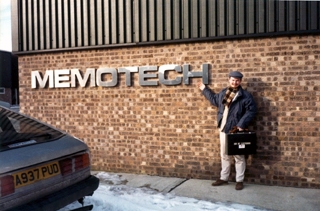
|
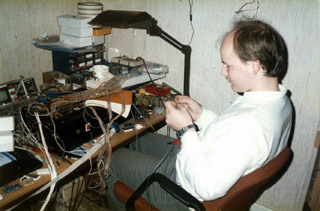 |
|
One of the owners of Norbit Elektronikk arriving at
the Memotech Factory in Witney, Oxfordshire.
Norbit worked with Memotech at the factory,
developing the prototype for the Super-Toolbox which
was offered with the Russian schools bid. |
The
Super-Toolbox was built inside a customised version
of the FDX case. If you look closely, you can see
the MTX keyboard peeking out on the left.
Pictures from the
Misolima UK website. |
Anne-Seline also recalls that "the red MTX
demoed in Moscow was a lash up of prototyping boards inside
the red case".
The End Game
+
Memotech's commitment to the Russian schools
bid necessitated significant investment of time and money to
allow them to offer a system to meet the exact needs of the
Russians. Even after the award of the first order, Memotech
continued to develop the hardware and software during the
second half of 1985, committing scare resources even while
domestic sales were declining, unfortunately, nothing came
of these efforts.
You will find various pages on the web
attributing failure to secure the Russian deal as a major
factor in Memotech's demise but
Geoff Boyd does not support that
assertion. By the time of the Russian bid, the writing was already
on the wall, not just for Memotech, but for the majority of
the UK home computer manufacturers of the time. The Russian deal was
the last throw of the dice for Memotech and when it failed,
Memotech had nowhere to go and the company was put into
administrative receivership
in early 1986 before being re-launched by
Geoff Boyd as Memotech Computers
Limited. You can read more about the circumstances of the
failure of Memotech Computers on my
MTX About page.
The Russians went on to place additional MSX
orders for MSX-1 and MSX-2 systems from a number
of manufacturers including Yamaha, Daewoo and Toshiba for
installation in Russian schools.
|
Related articles
from the period |
|
 |
Popular Computing Weekly, 14 February 1985, News
Desk Discussing the exhibitions by Acorn, Sinclair
and Memotech at Technobuch '85 in
Moscow as part of their, ultimately unsuccessful,
attempts to gain access to the Russian schools
market. |
|
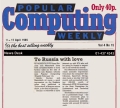 |
Popular Computing Weekly, 11 April 1985, News
Desk Memotech and Sinclair were invited back to
Russia in the April of 1985 for further
negotiations. |
|
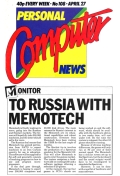 |
Personal Computer News, Issue 108, 27 April
1985, Monitor Confirming granting of export
licenses to Memotech for the sale of MTX computers
to the Eastern Block. |
|
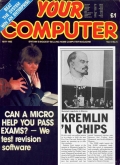 |
Your Computer, May 1985, Editorial Describing
the potential opportunity in Russia and
noting "Memotech as "the surprise front runner". |
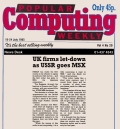 |
Popular Computing Weekly, 18 July 1985, News
Desk The writing is on the wall - the first order
goes to MSX! |
|
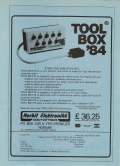 |
I have an old magazine, not sure which one, advert for "ToolBox '84" from Norbit which looks like an interface for the
joystick port which provided a user programmable
interface for a number of micros, including the MTX.
You can see the advert
here. This interface seems to be the origins of
Misolima, there is a really
interesting article on their website which
describes their early days, including interfacing to
the Memotech computer. |
 |
Misolima has a photo of the ToolBox '85 unit on
their
UK website.
From their humble beginnings with the 8-bit
micros of the '80s, now based in Thailand,
Misolima have
grown to produce a range of embedded systems used in
home and office automation. |
| |
|
+ Some details
from e-mail conversations with Geoff Boyd, November 2012
|